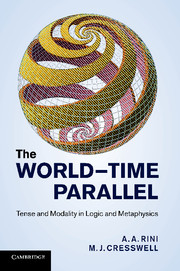Book contents
4 - The privileged position
from PART I - TRUTH AND INDEXICALITY
Published online by Cambridge University Press: 05 March 2012
Summary
There is a view of time which says that all times are equally real, and that the appearance of anything special about today is illusory. This view is sometimes called the ‘eternalist’ view of time, and is contrasted with what is called ‘presentism’ – the view that only the present is real. There is a view of modality called ‘possibilism’, which says that all possible worlds are equally real – that other worlds are, at least metaphysically, as real as the actual world in the way that other times are often thought to be metaphysically just as real as the present. This contrasts with ‘actualism’ – the view that only the actual is real.
In this chapter we address one alleged difference between presentism and actualism. One might be tempted to say the following. Among the many possible worlds there is one which is metaphysically privileged in a way none of the others are. It is actual. This is a powerful picture. One might suppose that the temporal analogy fails at this point. No presentist thinks that (say) 8.15 am NZDT on 31 December 2008 is more real than any other time; yet actualism holds that one world is privileged. Surely that is a difference? But is it? What is it to regard a world or time as privileged? A tempting option for the actualist is to designate one of the possible worlds as the actual world, @, and define actual truth as truth in @.
- Type
- Chapter
- Information
- The World-Time ParallelTense and Modality in Logic and Metaphysics, pp. 39 - 48Publisher: Cambridge University PressPrint publication year: 2012



